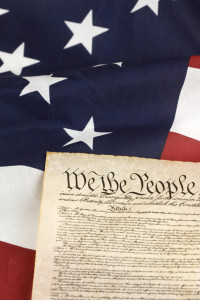By the time you read this issue of ALIVE, the 2016 election juggernaut called Super Tuesday will be history. If conventional wisdom has it right, the two individuals now poised to ride their current momentum all the way to a final showdown in November are Hillary Clinton for the Democrats and Donald Trump for the Republicans.
Now I suppose writing a column like this might just classify me as a bit of a “media mini-pundit;” after all, I’ve used this space before to bloviate on politics—why not jump in with the rest and offer my two cents’ worth now.
Okay, so what do I have to say about this stage of the election cycle? Oh, there are so very many places I could start. One line of thought breaks into several others, then it all circles back, leaving me a bit queasy. Like soap bubbles, questions rise up then pop: What? Did he just say that? Did she really do that? Seriously?
After much thought about where we’ve been and where we seem to be headed as a nation, I have come to a conclusion: We are in trouble—and the cause of that trouble is us!
We are reaping a harvest of seeds sown in two monoliths of influence in today’s America: public education and popular culture. In the first case, there has been an obvious, monumental failure. How many high school seniors today—no, how many Americans in general—can even identify the three branches of government, let alone explain the primary responsibilities of each?
And how about the Constitution? How many citizens today understand that when the President takes the
oath of office, he does so with the pledge: “I do solemnly swear that I will faithfully execute the Office of President of the United States, and will to the best of my ability, preserve, protect and defend the Constitution of the United States.” All of our elected representatives take a similar oath. Do we understand that it is our responsibility to hold them accountable in this?
Likewise, before we even consider someone for the highest office in the land, shouldn’t we be certain that person knows what the Constitution says and what the Bill of Rights guarantee? Are they willing to “preserve, protect and defend” every part of the Constitution, or just the parts that are currently popular (i.e., popular culture: the second monolith of influence)?
One of the central points in all of the debate surrounding the very creation of these United States was the framers’ fear of an overly-powerful federal government, and in particular, the executive branch of that government. The first Americans knew from experience that the last thing they wanted was another king.
We are where we are because we awash in an electorate with little understanding about the limits intended for our own government—limits intended for our own good. Adherence to our Constitution and Bill of Rights should be the primary criteria by which we measure the fitness of whomever we elect to be our President.
The powers not delegated to the United States by the Constitution, nor prohibited by it to the States, are reserved to the States, respectively, or to the people. –The 10th Amendment to the United States Constitution.
